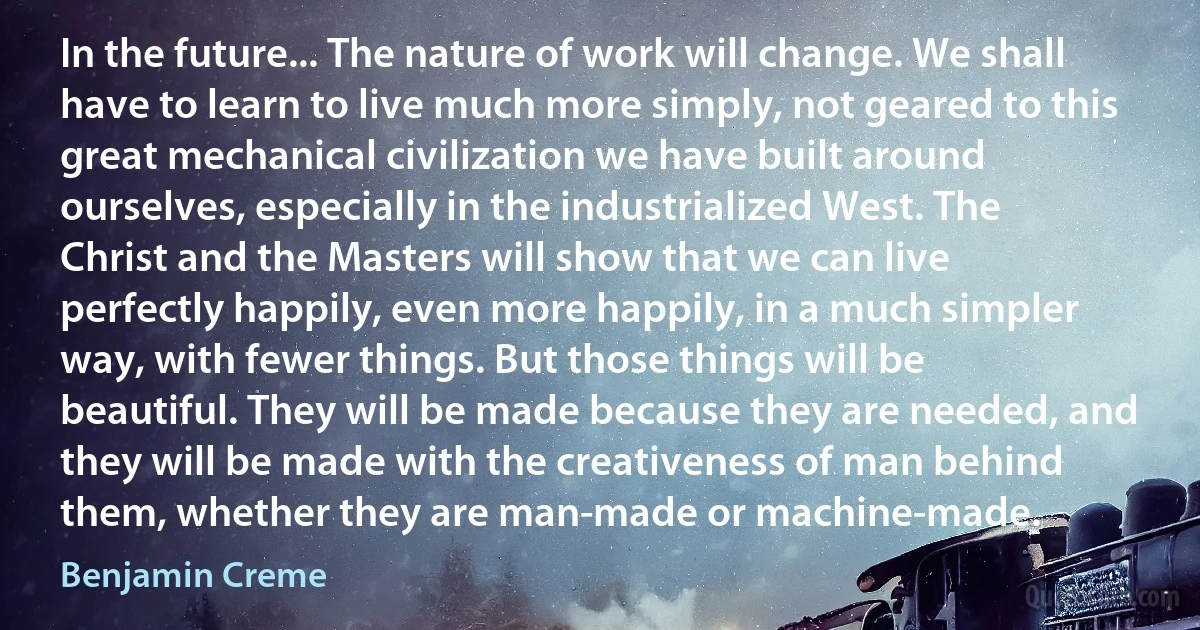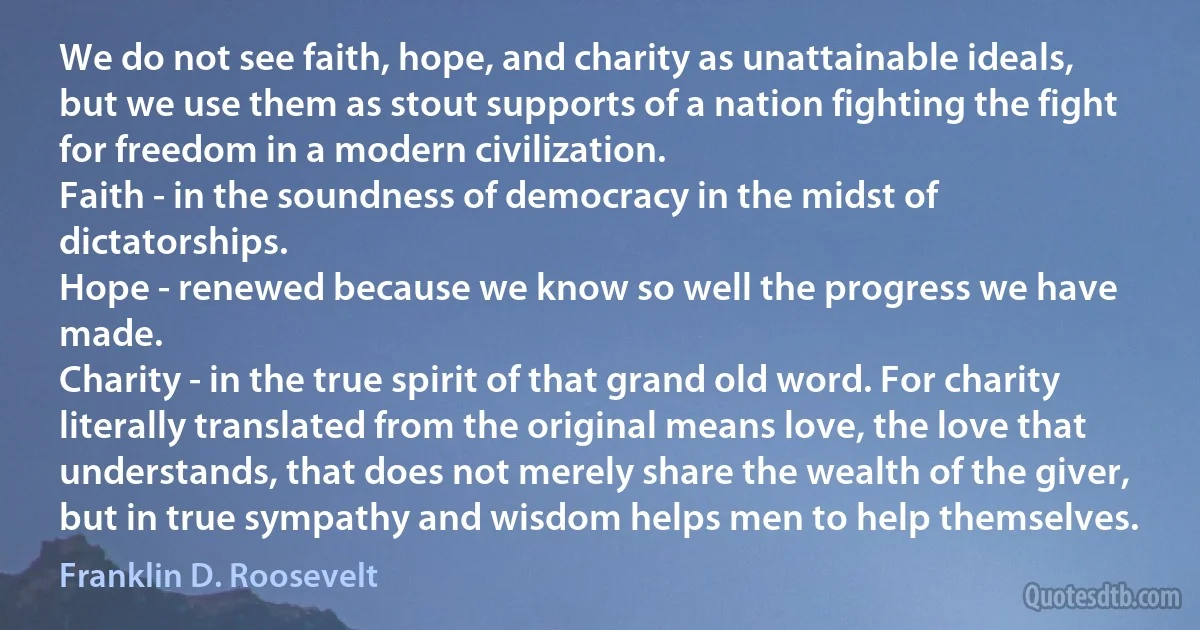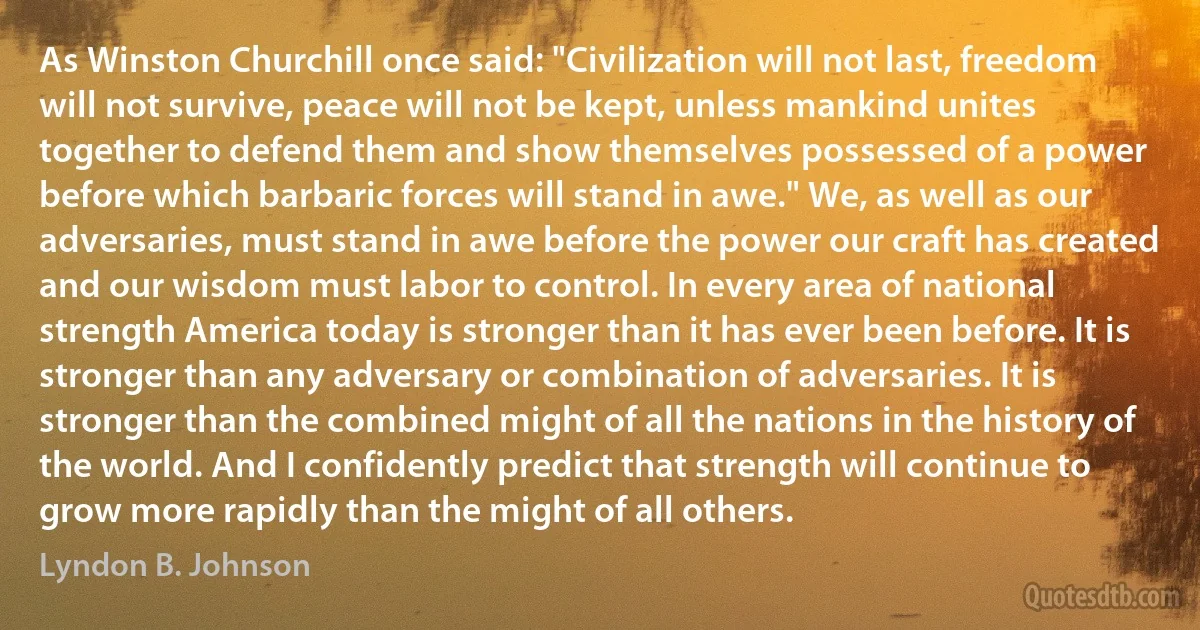Civilization Quotes - page 72
The anti-Christ is behind us; it has been, it has done its destructive work, it has gone. Now it has to be "chained down for a time and half a time". This means sealed off to its own domain for the age of Aquarius - that is "the time" - and half the following age, the age of Capricorn, when it will be released again. In the middle of the age of Capricorn the `beast' will be released once more, there will be another great war, this time fought out on the mental planes. That will be the third phase of the manifestation of the anti-Christ. It was the war between the forces of light and the forces of evil, as we call them (the forces of materiality as they are called by the Masters), which destroyed the ancient Atlantean civilization some 100,000 years ago.

Benjamin Creme
The purpose of our evolutionary existence, then, is to manifest the soul's qualities on the physical plane, and so to spiritualize matter. Meditation provides a more-or-less scientific means, depending on the meditation, of contacting the soul and gradually becoming at one with the soul, so that it can manifest clearly and potently on the physical plane. When we see such individuals, we perceive them as radiating meaning and purpose – for example, exceptionally creative artists, scientists, politicians or educators. Such persons are quite obviously governed by a force altogether different from the norm. It is the energy of the soul which is pouring through them, making them the creative beings who enrich our culture and civilization.

Benjamin Creme
The Sphinx, and of course the Pyramid, were connected with the Ancient Mysteries, the Mysteries of initiation, for initiation and the Mystery Schools go back to Atlantean times. The process of initiation was instituted in mid-Atlantean times, and the remains in Egypt, South America - Mexico and Peru - and also in Chaldea and Babylon, relate to these ancient civilizations. They are degenerated forms of it, for the Atlantean civilization was a tremendous, scientific civilization, such as the world has not seen since.

Benjamin Creme
Egypt was the home of magic - Atlantean magic... Black magic was tremendously rampant in Atlantean times, and ...there was a great war, between the forces of Light and Darkness, which brought that civilization to an end. As a result of that war the Hierarchy of Light became occult. They removed Themselves from the everyday world to Their mountain and desert retreats, leaving mankind to fend for itself, and to learn through trial and error. They return now among us, one by one.

Benjamin Creme
It is through Western categories, and hence the Western 'gaze', that the people who constitute the Judeo-Christian traditions see the world. This gives the Western perspective a de facto status as arbiter of what is considered universally true. When another civilization is the object of such a gaze, it becomes relative and no longer universal. Indeed, its depiction as the alien makes it interesting precisely because it is particular and not universal.

Rajiv Malhotra
So impressive was Ashoka's example that many other Asian monarchs adopted it. Japan's Prince Shotuku, for example, used it to unify the Japanese nation and improve international relations. For this policy, the renowned historians Arnold Toynbee and H.G. Wells have called Ashoka the greatest monarch who ever lived. Furthermore, when India commanded superiority in the eyes of the nations that wanted to receive its Buddhist civilization (such as China, Mongolia, Cambodia, Indonesia and Thailand), there was never any attempt to impose rulers or governance on others, or ask for taxation or tribute to any Indian nexus, or subvert the native cultures, languages and histories of those nations. The contrast between this and the manner in which Western civilization has spread is stark and warrants greater attention.

Rajiv Malhotra
I have no perfect panacea for human ills. And even if I had I would not attempt to present a system of philosophy between the soup and fish, but this much I will say: The distinctively modern custom of marital bundling is the doom of chivalry and death of passion. It wears all tender sentiment to a napless warp, and no wonder is it that the novelist, without he has a seared and bitter heart, hesitates to follow the couple beyond the church door. There is no greater reproach to our civilization than the sight of men joking the boy whose heart is pierced by the first rays of a life-giving sun, or of our expecting a girl to blush because she is twice God's child today she was yesterday.

Elbert Hubbard
Not only has our generation lost faith in Providence but also in man himself, in his institutions and often in those who are nearest to him. In their despair a number of those who no longer have confidence in the leadership of our society look up to the writer, the master of words. They hope against hope that the man of talent and sensitivity can perhaps rescue civilization. Maybe there is a spark of the prophet in the artist after all.

Isaac Bashevis Singer
It is only through science and art that civilization is of value. Some have wondered at the formula: science for its own sake; an yet it is as good as life for its own sake, if life is only misery; and even as happiness for its own sake, if we do not believe that all pleasures are of the same quality...
Every act should have an aim. We must suffer, we must work, we must pay for our place at the game, but this is for seeing's sake; or at the very least that others may one day see.

Henri Poincaré
If in this book harsh words are spoken about some of the greatest among the intellectual leaders of mankind, my motive is not, I hope, the wish to belittle them. It springs rather from my conviction that, if our civilization is to survive, we must break with the habit of deference to great men. Great men may make great mistakes; and as the book tries to show, some of the greatest leaders of the past supported the perennial attack on freedom and reason. Their influence, too rarely challenged, continues to mislead those on whose defence civilization depends, and to divide them. The responsibility of this tragic and possibly fatal division becomes ours if we hesitate to be outspoken in our criticism of what admittedly is a part of our intellectual heritage. By reluctance to criticize some of it, we may help to destroy it all.

Karl Popper
If a good civilization is the final goal, and if we are to devote to it the larger part of this new decade, we must set above all other duties the duty of education education in the school and out of the school: the improvement of all means of communication, such as schools, universities, radio, television, and the press.

Luis Muñoz Marín
And all the time - such is the tragi-comedy of our situation - we continue to clamor for those very qualities we are rendering impossible. You can hardly open a periodical without coming across the statement that what our civilization needs is more "drive”, or dynamism, or self-sacrifice, or "creativity”. In a sort of ghastly simplicity we remove the organ and demand the function. We make men without chests and expect of them virtue and enterprise. We laugh at honour and are shocked to find traitors in our midst. We castrate and bid the geldings be fruitful.

C. S. Lewis
This topic brings me to that worst outcrop of the herd nature, the military system, which I abhor. That a man can take pleasure in marching in formation to the strains of a band is enough to make me despise him. He has only been given his big brain by mistake; a backbone was all he needed. This plague-spot of civilization ought to be abolished with all possible speed. Heroism by order, senseless violence, and all the pestilent nonsense that does by the name of patriotism--how I hate them! War seems to me a mean, contemptible thing: I would rather be hacked in pieces than take part in such an abominable business. And yet so high, in spite of everything, is my opinion of the human race that I believe this bogey would have disappeared long ago, had the sound sense of the nations not been systematically corrupted by commercial and political interests acting through the schools and the Press.

Albert Einstein
I believe that truth is the glue that holds government together, not only our Government but civilization itself. That bond, though strained, is unbroken at home and abroad. In all my public and private acts as your President, I expect to follow my instincts of openness and candor with full confidence that honesty is always the best policy in the end.

Gerald Ford
I think of what happened to Greece and Rome, and you see what is left-only the pillars. What has happened, of course, is that the great civilizations of the past, as they have become wealthy, as they have lost their will to live, to improve, they then have become subject to decadence that eventually destroys the civilization. The United States is now reaching that period.

Richard Nixon
The next day Rastignac dressed himself very elegantly, and about three o'clock in the afternoon went to call on Mme. de Restaud. On the way thither he indulged in the wild intoxicating dreams which fill a young head so full of delicious excitement. Young men at his age take no account of obstacles nor of dangers; they see success in every direction; imagination has free play, and turns their lives into a romance; they are saddened or discouraged by the collapse of one of the visionary schemes that have no existence save in their heated fancy. If youth were not ignorant and timid, civilization would be impossible.

Honoré de Balzac
An ancient Chinese curse runs, "May you live in interesting times." Since the fall of the Roman Empire, there has rarely been more interesting times than these. Whenever history becomes unstable and destinies hang in the balance, then magicians and messiahs appear everywhere. Our own civilization has moved into an epoch of permanent crisis and upheaval, and we are beset with a plague of wizards. They serve an historic purpose, for whenever a society undergoes radical change, alternative spiritualities proliferate, and from among these a culture will select a new world view.

Peter J. Carroll
Looking back at the recent history of the world, I find it amazing how far civilization has retrogressed so quickly. As recently as World War I - granted the rules were violated at times - we had a set of rules of warfare in which armies didn't make war against civilians: Soldiers fought soldiers. Then came World War II and Hitler's philosophy of total war, which meant the bombing not only of soldiers but of factories that produced their rifles, and, if surrounding communities were also hit, that was to be accepted; then, as the war progressed, it became common for the combatants simply to attack civilians as part of military strategy. By the time the 1980s rolled around, we were placing our entire faith in a weapon whose fundamental target was the civilian population.

Ronald Reagan
A complete destruction of cities, industry, transport, and systems of education, a poisoning of fields, water, and air by radioactivity, a physical destruction of the larger part of mankind, poverty, barbarism, a return to savagery, and a genetic degeneracy of the survivors under the impact of radiation, a destruction of the material and information basis of civilization - this is a measure of the peril that threatens the world as a result of the estrangement of the world's two super-powers.
Every rational creature, finding itself on the brink of a disaster, first tries to get away from the brink and only then does it think about the satisfaction of its other needs. If mankind is to get away from the brink, it must overcome its divisions.

Andrei Sakharov



